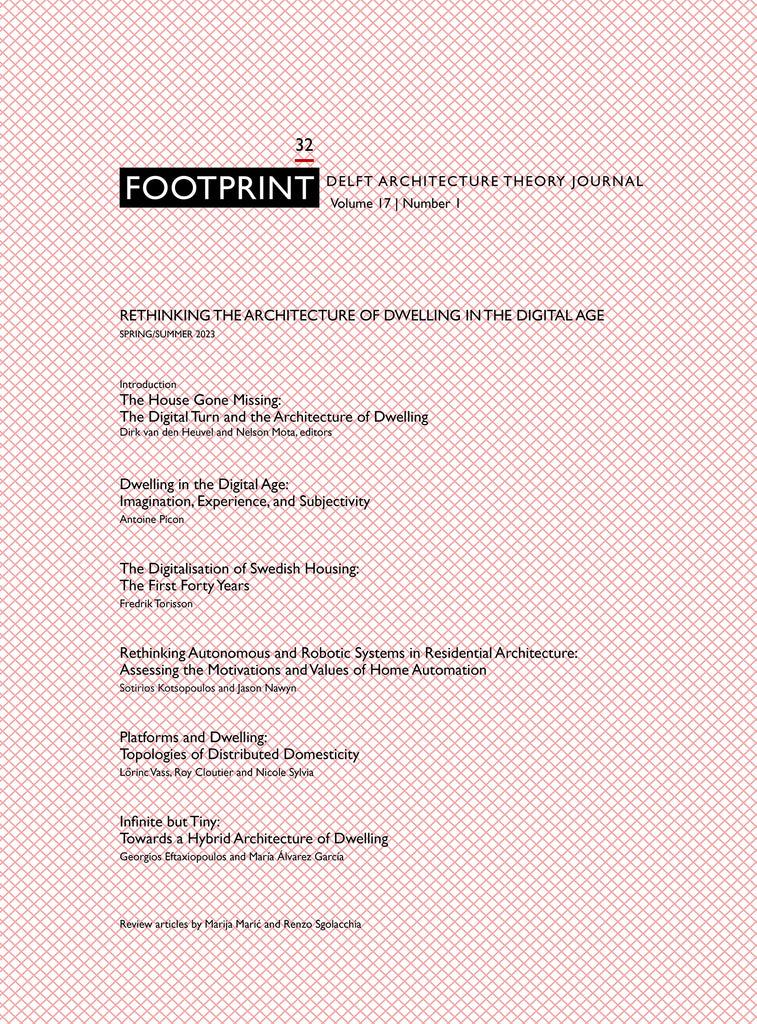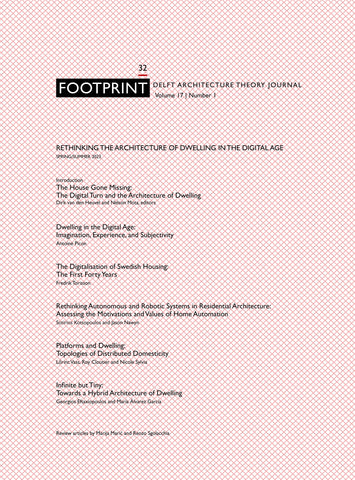Your cart is currently empty!
Bookazines / Series
Footprint 32 Rethinking the Architecture of Dwelling in the Digital Age
++++++
+++Nelson Mota, Dirk van den Heuvel [eds.]+++
English
Published in cooperation with Architecture Theory Chair (TU Delft) and Stichting Footprint: http://footprint.tudelft.nl/
For a subscription: Bruil & Van de Staaij
+++
| Footprint is a peer-reviewed architecture and theory academic journal
| An exploration of conceptual frameworks and methods of inquiry through critical and reflexive texts
Footprint 32 looks into the many ways the digital turn has impacted the architecture of dwelling. The issue originates from a simple observation: After the digital turn, the house as a paradigm for the discipline seemed to have disappeared from architecture debates. Recent theorisations of the digital in architecture have almost exclusively focused on new methods of production and notions of materiality alongside profound changes to the urban and social dimensions of the built environment. The question of dwelling after the digital turn leads to scrutiny of the history of the digitisation of the house and the shifting nature of domesticity, and to an exploration of involved motivations and values, oscillating between a techno-utopianism to a techno-capitalism. While the boundaries between real and virtual realms are blurred, the house and dwelling find a reconceptualisation in ecological and relational terms, thereby dissolving the house as a discrete object or entity. Privacy, autonomy, and physicality are in need of a rebalancing.
Footprint is a peer-reviewed journal presenting academic research in the field of architecture theory. The journal encourages the study of architecture and the urban environment as a means of comprehending culture and society, and as a tool for relating them to shifting ideological doctrines and philosophical ideas. The journal promotes the creation and development – or revision – of conceptual frameworks and methods of inquiry. The journal is engaged in creating a body of critical and reflexive texts with a breadth and depth of thought which would enrich the architecture discipline and produce new knowledge, conceptual methodologies and original understandings. Footprint is grateful to our peer reviewers, who generously offered their time and expertise.
€25.00
Footprint 32 Rethinking the Architecture of Dwelling in the Digital Age
€25.00
Architecture / Bookazines / Series / Theory / Urbanism
English
Published in cooperation with Architecture Theory Chair (TU Delft) and Stichting Footprint: http://footprint.tudelft.nl/
For a subscription: Bruil & Van de Staaij
| Footprint is a peer-reviewed architecture and theory academic journal
| An exploration of conceptual frameworks and methods of inquiry through critical and reflexive texts
Footprint 32 looks into the many ways the digital turn has impacted the architecture of dwelling. The issue originates from a simple observation: After the digital turn, the house as a paradigm for the discipline seemed to have disappeared from architecture debates. Recent theorisations of the digital in architecture have almost exclusively focused on new methods of production and notions of materiality alongside profound changes to the urban and social dimensions of the built environment. The question of dwelling after the digital turn leads to scrutiny of the history of the digitisation of the house and the shifting nature of domesticity, and to an exploration of involved motivations and values, oscillating between a techno-utopianism to a techno-capitalism. While the boundaries between real and virtual realms are blurred, the house and dwelling find a reconceptualisation in ecological and relational terms, thereby dissolving the house as a discrete object or entity. Privacy, autonomy, and physicality are in need of a rebalancing.
Footprint is a peer-reviewed journal presenting academic research in the field of architecture theory. The journal encourages the study of architecture and the urban environment as a means of comprehending culture and society, and as a tool for relating them to shifting ideological doctrines and philosophical ideas. The journal promotes the creation and development – or revision – of conceptual frameworks and methods of inquiry. The journal is engaged in creating a body of critical and reflexive texts with a breadth and depth of thought which would enrich the architecture discipline and produce new knowledge, conceptual methodologies and original understandings. Footprint is grateful to our peer reviewers, who generously offered their time and expertise.



